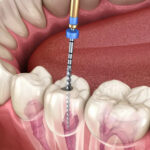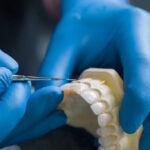For years, we have known that eating a high fat diet can lead to numerous health problems, such as obesity and heart disease. But now there’s compelling research that suggests a link between high fat diets and gum disease as well. Recent studies have highlighted the potential for high fat diets to increase your risk of developing periodontal diseases, such as gingivitis and periodontitis. In this blog post, we will explore how this link works, what consequences it has on our oral health, and how you can reduce your risk of developing gum disease. Read on to learn more about this important connection between diet and dental health!
What is Gum Disease?
Gum disease is a serious infection of the gums that can lead to tooth loss. It is caused by bacteria that build up on the teeth and gums. These bacteria can cause inflammation and bleeding of the gums. If left untreated, gum disease can progress to periodontitis, which is a more serious form of gum disease that can result in bone loss and tooth loss. Gum disease is preventable with good oral hygiene and regular dental checkups.
The Link Between High Fat Diets and Gum Disease
There’s a new study that links high fat diets with gum disease. The study, published in the Journal of Periodontology, found that people who consume a diet high in saturated fat are more likely to develop periodontitis, which is a serious form of gum disease.
This is the first study to link dietary fat intake with periodontitis. The researchers looked at data from over 11,000 adults who participated in the National Health and Nutrition Examination Survey. They found that those who consumed the most saturated fat were 22% more likely to develop periodontitis than those who consumed the least amount of saturated fat.
Saturated fat is found in animal products such as meat, butter, and cheese. It’s also found in some plant-based oils such as coconut oil and palm oil. The American Heart Association recommends limiting saturated fat intake to no more than 6% of total daily calories.
If you’re concerned about your risk of developing gum disease, talk to your dentist or periodontist about ways to reduce your risk.
How to Prevent Gum Disease
Gum disease is a serious problem that can lead to tooth loss and other health problems. There are a few things you can do to help prevent gum disease:
1. Brush your teeth twice a day with a soft-bristled brush. Be sure to use gentle circular motions and avoid scrubbing too hard.
2. Floss your teeth every day. This will help remove plaque and bacteria from between your teeth and gums.
3. Eat a healthy diet. A diet high in sugar can contribute to gum disease, so be sure to eat plenty of fruits, vegetables, and whole grains.
4. Quit smoking. Smoking is a major risk factor for gum disease, so quitting will help reduce your chances of developing the condition.
5. See your dentist regularly for cleanings and checkups. Your dentist can spot early signs of gum disease and provide treatment to help prevent it from getting worse. You can also find tips from social media, many dentists are now becoming instagram influencers who are uploading informative videos about oral health.
How to Maintain Good Oral Health
There are many things you can do to maintain good oral health and prevent gum disease. First, brush your teeth at least twice a day with fluoride toothpaste. Floss daily to remove plaque from between your teeth. We all know oral health is important, which is why general examination is one of the best way to monitor your oral health. Visit your dentist regularly for professional cleanings and checkups.
Eat a balanced diet and avoid sugary snacks and drinks. Quit smoking if you smoke cigarettes or use tobacco products. Use a mouth rinse to help reduce plaque and bacteria in your mouth.
Some medical conditions can increase your risk for gum disease. If you have diabetes, make sure to control your blood sugar levels and see your dentist regularly. If you are taking medication that causes dry mouth, talk to your dentist about ways to combat this side effect.
Conclusion
In conclusion, high fat diets have been linked to an increased risk of gum disease. This is yet another reason why it’s important to monitor your diet and consume a variety of healthy foods in order to maintain good oral health. Eating a balanced diet with lean proteins, whole grains, fruits, vegetables and healthy fats can help keep your teeth and gums strong. If you are concerned about your current eating habits or if you are experiencing any periodontal issues such as bleeding gums or bad breath, talk to your dentist about the best options for maintaining oral hygiene.





